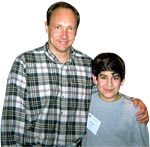

Pass the baton: Aaron meets Tim Berners-Lee, creator of the world wide web
It has always been difficult to work out what the rules are on the net - or who is really in charge. Deep down, even in technical nitty-gritty land, nobody wants to come out and declare hard-and-fast laws. It's all terribly touchy-feely and communal. The most vital summaries of how the net works go under the meek label of "Requests For Comments", known universally as RFCs. These originated in the academic beginnings of the net, when its creators attempted to codify a rough consensus of casual meetings in formal documents. Without RFCs, the net would collapse.
How your computer talks to a service provider such as CompuServe or Freeserve is a convention, embodied in an RFC. How e-mail works relies on another RFC. If anyone truly makes the net what it is, it's the people behind these standards. I was reminded of one name this week - Aaron Swartz, in his spare time, works on a standard for connecting together news sites. The system he works on is used by billion-dollar companies such as Reuters and Netscape. It was only after I wrote the other week about influential web journalists who are in their teens that someone mentioned Aaron's age. He is 14.
"Originally, I was worried about revealing my age and did my bestto keep it a secret," Aaron wrote to me after I sought him out. "Now, I let my words speak for themselves."
Online, his words are clear and precise - crucial for working on a net standard. Aaron's techie knowledge is impressive, but that is never enough when you are trying to build a precise standard from a shaky consensus. "He's not just a bit smart: he marshals power very well, and is persistent," writes Dave Winer, a Silicon Valley CEO and Aaron's occasional sparring partner. "Eventually, you come round to his way of thinking, or he comes round to yours. These are the essential ingredients in developing good technology. We are looking for the right answer, not to be proved right, or to prove the other guy wrong."
Aaron is not a hot-housed prodigy. People who have met him say he is well balanced and sociable, and cajoling a standard among cranky net engineers requires consummate social skills. He devotes effort, but no more, he says, than with any other teenage pursuit ("It doesn't feel like work; it feels like conversation").
Elsewhere, Aaron finds his age an occasional hindrance. "Teachers at school and other adults instantly assume that I can't possibly be doing anything 'real' and must be doing some special project for kids." On the net, by contrast, Aaron is taken seriously. He is working on another project now, applying what he has learnt online to build a better protocol for education.
"One of the things the web teaches us is that everything is connected (hyperlinks) and we all should work together (standards). Too often school teaches us that everything is separate (many different 'subjects') and that we should all work alone." If that's not a Request For Comments, I don't know what is. Aaron's home page is at www.aaronsw.com.
Danny O'Brien co-edits the online newsletter Need to Know (www.ntk.net)
Publication Note: This article was originally published in the Sunday Times "Doors" Internet guide (section 11) on 2001-04-29 and was previously available on the Web at sunday-times.co.uk. - Aaron, 2002-04-07